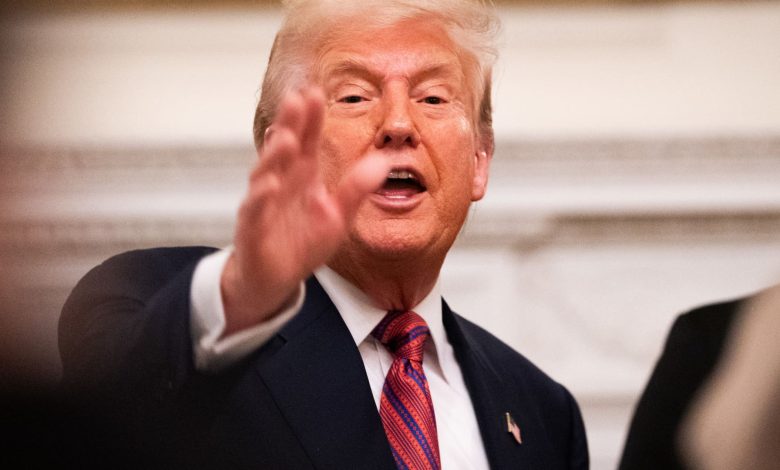U.S. plays hardball on tariffs deadline as EU battles for a deal

President Donald Trump speaks at a dinner for Republican Senators at the White House in Washington, DC, on July 18, 2025.
Photo by Allison Robbert/For The Washington Post via Getty Images
The U.S. has signaled it will not let up on its Aug. 1 deadline for higher tariffs on the European Union as the bloc fights to strike a deal in time.
Over the weekend, U.S. Commerce Secretary Howard Lutnick said he was confident a trade deal could be struck with the European Union, but warned that the deadline for a baseline 30% tariff is fixed.
“That’s a hard deadline, so on August 1, the new tariff rates will come in,” Lutnick said Sunday on CBS News when asked about the deadline for his EU tariffs.
He did signal that talks could continue after this date, however, noting: “These are the two biggest trading partners in the world, talking to each other. We’ll get a deal done. I am confident we’ll get a deal done.”
“Nothing stops countries from talking to us after August 1, but they’re going to start paying the tariffs on August 1,” he added.
The EU has said it is preparing retaliatory measures against the U.S. if punitive trade tariffs are imposed. Lutnick dismissed the possibility of the EU targeting items like Boeing airplanes and Kentucky bourbon, however, saying, “they’re just not going to do that.”
Last-ditch talks to reach a trade agreement are ongoing, with the EU hoping it can negotiate a lower tariff rate. The bloc had hoped it could strike a similar pact to the U.K., which was the first country to make a trade agreement with the U.S. That deal includes a 10% baseline tariff with some caveats relating to car, steel and aerospace imports.
But economists and analysts have become increasingly skeptical about Brussels’ ability to agree on a similar framework.
For one, the EU has a much trickier relationship with U.S. President Donald Trump than the U.K. does. Trump has frequently bemoaned what he sees as an imbalanced trade relationship and unfair trading practices, which the EU denies.
According to the European Council, total trade between the EU and U.S. amounted to 1.68 trillion euros ($1.96 trillion) in 2024. While the EU ran a trade surplus in goods, it recorded a deficit in services. Overall, the bloc had a surplus of around 50 billion euros last year, when both goods and services are taken into account.
Last Friday, the Financial Times reported that Trump was pushing for a minimum tariff of 15% to 20% on EU imports in any deal with the bloc. The president was also reportedly happy to keep duties on the auto sector at 25%, a move that would hurt car exporters in Germany particularly hard.
Speaking to CNBC’s “Europe Early Edition” on Monday, Arnaud Girod, head of economics and cross-asset strategy at Kepler Cheuvreux, said a rate of 15% to 20% “would be a total car crash for European exports.”
“On top of that, you add the euro strength that we’ve had … so that would start to cost and to be very painful for European exports, and, of course, would also potentially, you know, reignite some fears on the inflation front in the U.S.,” he added.
Mood change in Europe
The White House’s seemingly harsher stance toward Brussels has prompted policymakers to consider how they will respond to a 30% tariff, which would be a steep hike from the current 10% duty that came into effect in April.
One EU official told CNBC that there has been a clear shift in mood regarding the bloc’s potential response among all EU member states, except Hungary, whose leader, Viktor Orban, is a Trump ally.
The bloc’s potential countermeasures against the U.S. include levies on imports from the U.S. worth 21 billion euros, which are currently on pause until Aug. 6. The European Commission has also prepared a second round of potential tariffs targeting trade worth 72 billion euros.
Imports ranging from clothing to agricultural products and food and drink items could be affected.
Meanwhile, the Wall Street Journal and Bloomberg reported that an increasing number of EU member states have signalled their support for the bloc deploying its anti-coercion instrument. This is the EU’s most powerful trade tool, which would give the European Commission broad powers to take retaliatory action against the U.S.
Kepler Cheuvreux’s Girod welcomed the movement around tariff policy in the EU, saying the bloc was “finally” flexing its muscles and that this was needed to reach an agreement.
“They’ve been very, very, I would say, cool, with the U.S. so far, and now that we’re approaching the deadline, they have to sound a bit more aggressive,” Girod said. “Not getting a better deal than the U.K. is … an issue for the EU, and they have to prove that the whole structure of the EU is helpful.”
— CNBC’s Matthew Ward-Perkins contributed to this report.



